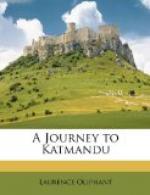The conquest of the valley of Katmandu was attended with circumstances of the greatest barbarity; thousands of the inhabitants were starved to death by the Ghorka King, Prithi Naraim. There were then in Nepaul a few Christians, converted by a Jesuit mission. These were all compelled to fly the country, some taking refuge in Thibet, others crossing our frontier and settling at Bettiah, where a Christian community at present exists. Not long after he had conquered Nepaul, the Ghorka monarch organized an expedition into Tartary, which was so signally successful that the H’Lassa Government was obliged to treat on humiliating conditions. This advantage was followed, in defiance of the treaty, by another invasion, which was only arrested by the forces of the Emperor, who, having heard of the violent proceedings in this distant part of his dominions, sent an army of 70,000 men to oppose the Ghorka invaders, who were completely overwhelmed and obliged to retreat. The Chinese followed the retiring force across their own frontier, and not until they had reached the valley of Noyakot, eighteen miles from Katmandu, did they consent to treat for peace, which was now humbly sued for by the Ghorka King.
Not satisfied with serving as soldiers in their own country, the Ghorkas have offered their services to the Indian Government, and two of its finest regiments are composed of soldiers of this race.
No European, as far as I could learn, has ever yet penetrated to their city, which however can contain no object of very great attraction, since it must want those Chinese peculiarities which render Katmandu and Patn so interesting, and must more nearly resemble the large cities of the plains. It has a large population, is well built and fortified, and is situated on a commanding eminence.
The Nepaul army is maintained partly by the state, the men being in some instances paid out of the treasury, but more frequently by an assignment of land to each man called a jaghire. They are thus remunerated at the expense of the Newars, who are the cultivators of the soil and were the original proprietors. Hence Nepaul is a warlike state, not merely from the natural disposition of its Ghorka conquerors, but from the inducements held out to them to become soldiers.
What would our grumbling agricultural population say to having soldiers billeted in each village, and living on the fat of the land? The Newars say, “Take away the army and give us free trade;” the farmers in England say, “Keep up the army and take away free trade.”
The minister told us of out-stations at which different regiments were posted, and wanted us to believe that the standing army of Nepaul exceeded 25,000 men. Every male is obliged to serve in the army for a year, and it requires great interest to be allowed to remain above that period, so eagerly is the profession of arms sought after.
Immediately facing the parade-ground stands the famous monument built by Bheem Singh, one of the most eminent prime ministers that Nepaul has ever seen, and who has left behind him proofs of his greatness in the many works, both useful and ornamental, which he erected.




